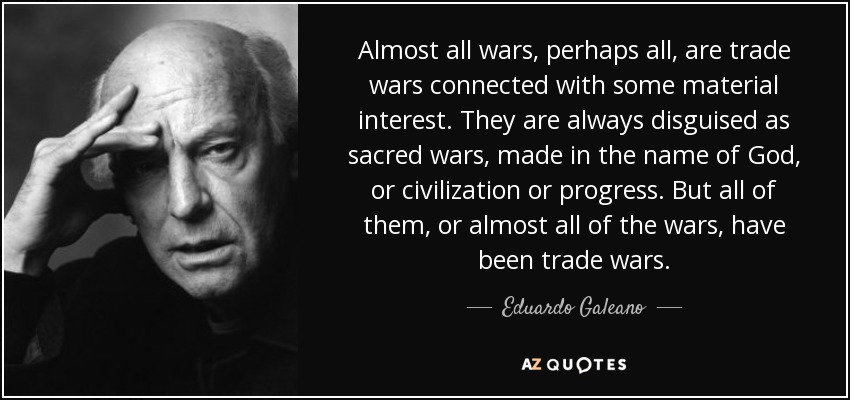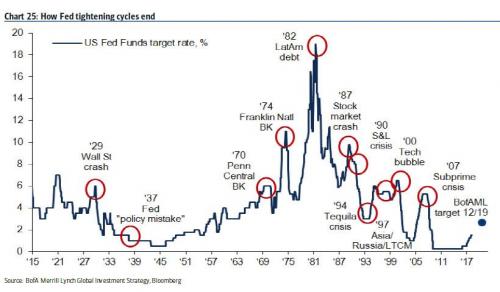– Global stock markets fall and main China index down sharp 3.8% at a two-year low
– Investors are starting to worry that Trump is deadly serious about a trade war
by John Stepek of Money Week

The Chinese stock market took a hit today.
The Shanghai Composite Index ended the session down 3.8% to close at a two-year low, notes Bloomberg.
What’s wrong?
Investors are starting to worry that Donald Trump is deadly serious about his enthusiasm for a trade war, that’s what’s wrong.
Trump has a point on China, although that doesn’t mean this is a good idea.
On Friday, Donald Trump released a list of $50bn-worth of Chinese goods that will face a 25% import tariff, with the aim of recouping “the annual cost of China’s state-backed theft of US intellectual property”, reports the FT. China retaliated by saying that it would impose tariffs on $50bn-worth of US products.
So, last night, Trump said that he had asked US trade officials to find another $200bn-worth that will earn a 10% tariff. These tariffs, he said, will go ahead unless China ditches its retaliation plans.
China didn’t react too cheerfully. It denounced the US as acting “irrationally” and warned of “strong, powerful countermeasures”.
It’s admittedly harder for China to retaliate by imposing more tariffs, as it only imported $130bn of goods from the US last year. However, as the FT points out, it has plenty of other options. For example, it could “make life harder” for the likes of Ford and GM, “for whom China is their largest market.” All the other US companies operating in China could be in the firing line too.
Investors are realising that Trump is quite serious about reducing the US trade deficit with China. And unlike on Europe – where tariffs and trade barriers are broadly the same on both sides of the relationship – Trump has a point on China. As Raoul Leering of ING points out, on average, China’s tariffs on US imports are a good bit higher than America’s tariffs on imports from China.
Moreover, US demand for Chinese products “contributes… five times as much to their GDP as their demand for US products adds to US GDP”. So, on a narrow level at least, this is a trade war that the US can, if not “win”, at least come away better off than its rival.
That’s not to say that this is an economically ideal solution. China is a big market and a lot of companies in the US won’t be happy about the idea of being effectively shut out of it. Indeed, plenty of business leaders are already protesting.
But if the political rationale adds up – and so far it seems to, what with China having long been a source of concern and anger for a large group of American voters – then Trump won’t be bothered about the economics of it.
Here’s what this could mean for investors
Anyway, what does this mean for markets? Trade wars aren’t good. Companies ultimately make money by selling stuff – whether physical goods or intangible services – to customers. Trade wars cut down on the number of potential customers out there.
Protectionism also means that companies have a smaller global pool of labour to choose from. That means higher wages, all else being equal. So it drives up costs too.
On the other hand, it means less competition for domestic companies. That means companies can also afford to raise prices. Given where we are in the economic cycle (we’re at or near the inflationary part), then that wouldn’t come as much of a surprise right now.
So you can certainly see why Chinese stocks have been hit hard. If they can’t sell to American consumers, then a lot of Chinese companies will be in trouble.
But emerging markets in general are hurting, both the stocks and their currencies. This is as much about “risk off” as anything else. The trouble with emerging markets is that investors are not particularly discriminating. You invest in emerging markets when you feel excited and positive about the outlook. When hard times hit, you pull the money back out and stash it at home.

Of course, if globalisation dries up, then that’ll end up keeping more capital onshore too, so that’s another issue facing emerging markets.
On the developed market side of things, German stocks are likely to be particularly hard hit – the domestic picture in Germany is being blamed for the recent decline in the Dax, but to be honest, it’s more likely because the German index is probably the biggest “sell” in the developed world if “de-globablisation” continues like this.
I wrote about Trump’s trade wars in the latest issue of MoneyWeek magazine, which is out just now – there are more tips in there. If you’re not already a subscriber, get yourself a copy now.
As for the trade war, is this going to continue to escalate? It all depends on what the participants do. It’s pretty clear that Trump has no intention of backing down. A trade war would hurt both economies, but on balance, it’d probably hurt China more. On the other hand, a trade war is unlikely to be good for the US stockmarket, and US voters dislike falling stockmarkets.
On balance, I suspect the political calculus favours Trump continuing to take a strong stand ahead of the mid-term elections in November. But a significant concession by China might change his mind.
As for China – it won’t like the idea of being cut off from the US market, but nor will it like the idea of losing face.
Put simply, this could go either way.
So make sure you’re hanging on to a bit of gold as well.
Courtesy of Money Week’s free daily investment email – Money Morning.
All Gold Is Not Equal – Learn how to own gold in the safest ways possible – On SoundCloud , Blubrry & iTunes. Watch on YouTube below
News and Commentary
Gold prices rise as U.S.-China trade tensions intensify (Reuters.com)
Trump Threatens China With Further Tariffs (Bloomberg.com)
Homebuilder sentiment drops in June due to soaring lumber costs (CNBC.com)
Source: BOAML via ZeroHedge
The cracks are starting to show in the eurozone’s most stable member (MoneyWeek.com)
Summers Warns the Biggest Economies Are Not Prepared for Another Recession (Bloomberg.com)
$300m gold trade on black market (Chronicle.co.zw)
Titanic of its time – Divers just made an eerie discovery on 1838 shipwreck (CharlotteObserver.com)
Gold Prices (LBMA AM)
18 Jun: USD 1,281.25, GBP 966.96 & EUR 1,103.93 per ounce
15 Jun: USD 1,300.10, GBP 978.98 & EUR 1,120.04 per ounce
14 Jun: USD 1,305.30, GBP 971.27 & EUR 1,103.89 per ounce
13 Jun: USD 1,294.40, GBP 971.58 & EUR 1,101.92 per ounce
12 Jun: USD 1,298.30, GBP 968.27 & EUR 1,100.44 per ounce
11 Jun: USD 1,296.05, GBP 969.32 & EUR 1,099.57 per ounce
08 Jun: USD 1,299.20, GBP 968.68 & EUR 1,103.93 per ounce
Silver Prices (LBMA)
18 Jun: USD 16.61, GBP 12.53 & EUR 14.29 per ounce
15 Jun: USD 17.23, GBP 12.96 & EUR 14.86 per ounce
14 Jun: USD 17.12, GBP 12.75 & EUR 14.48 per ounce
13 Jun: USD 16.91, GBP 12.68 & EUR 14.37 per ounce
12 Jun: USD 16.85, GBP 12.58 & EUR 14.30 per ounce
11 Jun: USD 16.76, GBP 12.55 & EUR 14.23 per ounce
08 Jun: USD 16.72, GBP 12.49 & EUR 14.25 per ounce
Recent Market Updates
– Own A “Bit Of Gold” As We Are Moving Ever Closer To A Trade War
– Bitcoin Price To $0 Or $1 Million In One Year? MoneyConf 2018 Poll
– Cashless Society – Good or Bad? MoneyConf 2018 Video
– Do We Still Need Banks In The Age Of Fintech?
– Total US Government Debt Is $200 Trillion – Debt Clock Ticking To Next Crisis
– All Gold is Not Equal – Goldnomics Podcast (Episode 4)
– “Without Gold I Would Have Starved To Death” – ECB Governor
– Swiss Government Pension Fund To Buy Gold Bars Worth Some €600 Million
– Turkey Uses Gold Bullion To Stabilise Its Currency And Economy
– Case for Gold in a Diversified Investment Portfolio
– Get “Positioned In Gold” Now As “You Will Not Have Time To Get Positioned” Later
– Consequences of Ignoring Economic Reality Are Dangerous
– Are Gold And Silver Bullion Obsolete In The Crypto Age?
– In Gold we Trust: 3 Important Factors Leading to the “Turning of the Monetary Tides”
– Silver Trading in Tight $1 Range As Pressure Builds For A Breakout
The post Own A “Bit Of Gold” As We Are Moving Ever Closer To A Trump Trade War appeared first on GoldCore Gold Bullion Dealer.
![]()


